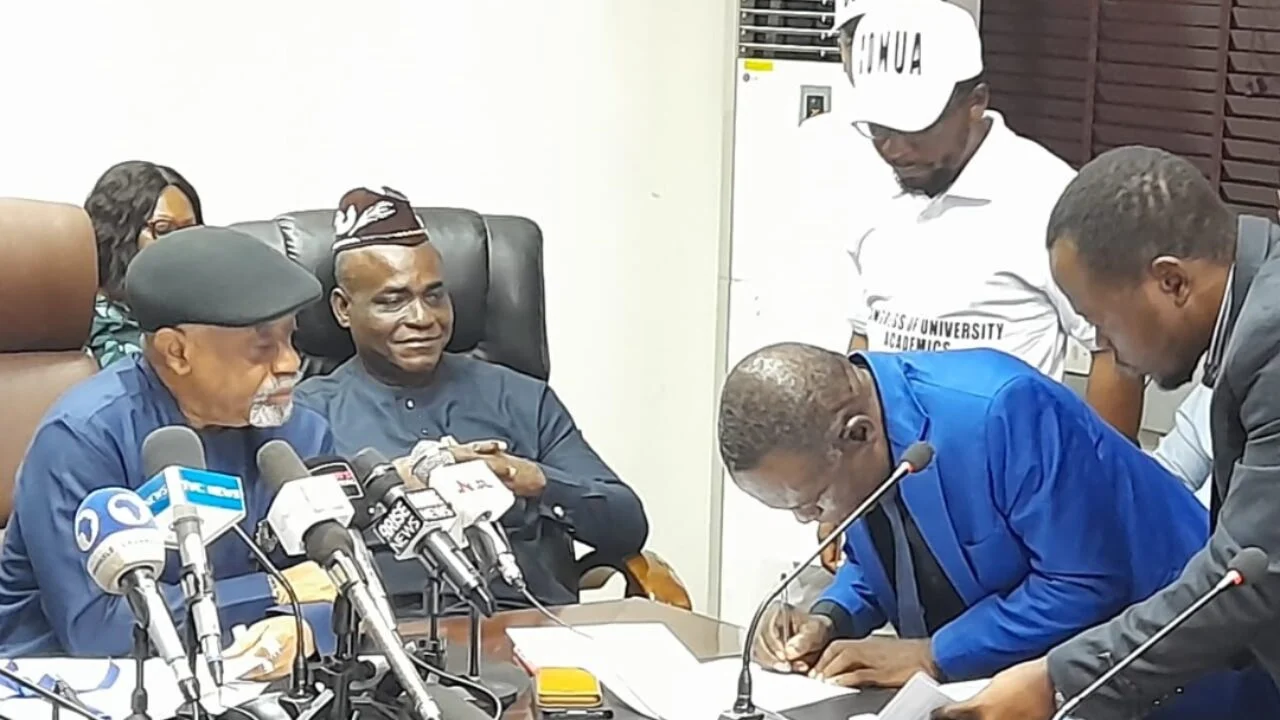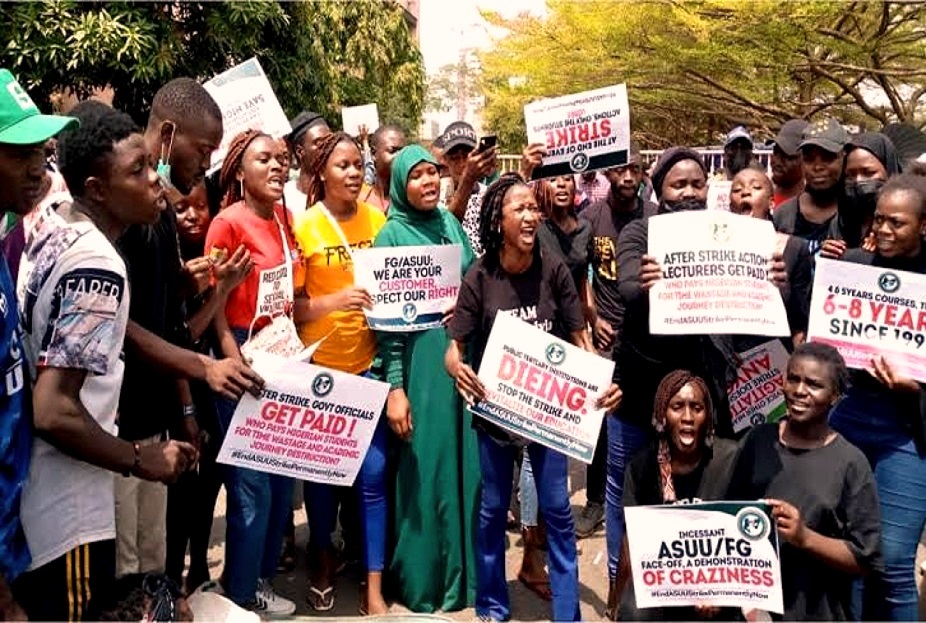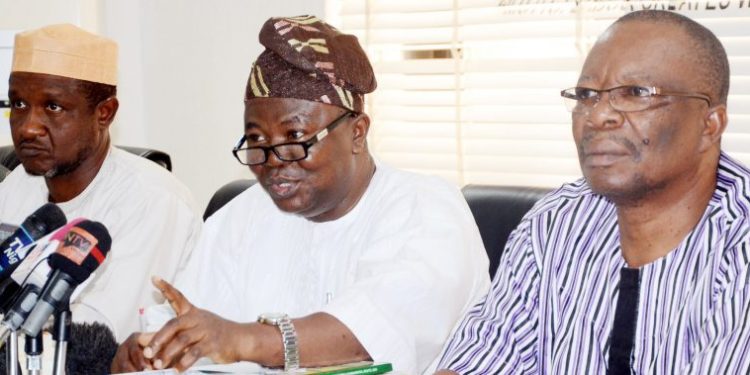By Lillian Okenwa
On Tuesday 4 October, the federal government formally recognised Congress of Nigerian University Academics (CONUA) with Dr Chris Ngige, Minister of Labour and Employment, presenting the union with a certificate of registration in Abuja.
In 2018, CONUA had disagreements with the Academic Staff Union of Universities (ASUU) and went its way.
CONUA’s registration is believed to be the government’s strategy to weaken ASUU’s influence amid its lingering strike and the move has since sparked heated reactions from stakeholders in the education sector. The registration came weeks after the government threatened to withdraw ASUU’s registration licence for allegedly not submitting its audited financial returns for over five years. Rights lawyer and senior advocate of Nigeria (SAN) Femi Falana, has said the registration of the CONUA) by the federal government is illegal.

ASUU has been on strike since February 14 to press home the demand for improved funding for universities, and a review of salaries for lecturers, among other issues. Several meetings between representatives of the union and the government to address the strike did not yield results.

On September 21, the National Industrial Court of Nigeria (NICN) ordered ASUU to call off its nationwide strike but the union went on appeal. However, the Appeal Court has ordered the striking lecturers to obey the ruling of the National Industrial Court and return to the classroom effective from October 7, 2022.
Earlier, President Muhammadu Buhari directed the Minister of Education, Adamu Adamu, to “solve” the ASUU crisis within two weeks. When the period expired, Adamu denied being given an ultimatum and asked university students to “sue” their lecturers over the seven-month-old strike. Thereafter, the Federal Government, through the Ministry of Labour and Employment, dragged ASUU before the NICN.

On its part notable social advocacy group, the Social and Economic Rights and Accountability Project, SERAP, along with undergraduates sued President Buhari, asking the court to “declare unlawful the refusal by the Federal Government to meet ASUU’s demands, which has occasioned the prolonged strike action and violated the students’ right to quality education.”
Here are some of ASSU’s demands:
1. Funding for the revitalisation of public universities. The Federal Government, in its agreement entered with the union in 2009 and 2013, agreed to inject a total of N1.3 trillion into public universities in six tranches, starting from 2013. Only N200 billion has been released since 2013.
2. Payment of earned academic allowances (EEA). The Federal Government had in 2019 agreed to pay lecturers EAA, but failed to implement it. The government finally agreed to pay the first tranche of the backlog of allowances in November 2019 and the second instalment by August 2020, but nothing was paid. In 2020, the Federal Government agreed to pay N40 billion. It also said it has released N22.127 billion earned allowances of both academic and non-academic workers of universities to 38 universities.

3. Reconstitution of the FGN/ASUU 2009 Renegotiation Committee. The Federal Government agreed to renegotiate the 2009 agreement to review the university’s conditions of service, funding, university autonomy and academic freedom. The conditions of service included a separate salary structure for university lectures to be known as ‘Consolidated University Academic Salary Structure’. Thirteen years later, the government inaugurated a seven-man committee to renegotiate the 2019 agreement, led by Nimi Briggs.

Ngige has since announced that the government does not have the money to pay ASUU what they are demanding which amounts to about N1.3trn. This is even as The Guardian Newspaper of 25 August 2022 reported that “Idle refineries workers earn N136b amid $3b upgrade cost.” Kingsley Jeremiah of The Guardian Newspaper reported thus:
“Despite being shut down, there are indications that the Nigerian National Petroleum Company Limited (NNPC) may have left over N136 billion as operational deficits across its three refineries in Kaduna, Port Harcourt and Warri. This is as concerns over delivery timeline and violations of local content law dog ongoing rehabilitation of the refineries.
“Recall that NNPC had shut down the 445,000-capacity refineries for over two years, yet kept the over 1,701 staff at the facilities, as it rehabilitates the Port Harcourt refinery for $1.5 billion and those of Warri and Kaduna for $1.4 billion.

“In August 2020, the total losses incurred by the refineries was N7,088 billion, it was N7,043 billion in September of the same year before moving to N5,489 billion in October. In November 2020, it went up to N5,995 billion and went further up to N8,279 billion in December that year.
“In January 2021, the operational deficit was N5,371 billion, February recorded an N6,879 billion loss, N3,866 billion in March, N3,544 billion in April, and N5,243 billion in May, N4,014 billion in June, N3,752 billion in July and N3,819 billion in August 2021.
“On average, NNPC spends, plus or minus, N68 billion in paying salaries and other expenses at the moribund refineries, yearly. In the last two years, the losses have amounted to an average of N136 billion.”
In a letter addressed to the Secretary to the Government of the Federal Republic of Nigeria, Ministers of Education and Labour and Productivity, Chairman Senate Committee on Education (Tertiary Institution), other top government functionaries, Committee of Pro Chancellors of State-Owned Universities (COPSU) and President, National Association of Nigerian Students (NANS), a former Attorney-General of Imo State and The Rapporteur, Victims of Persecution, a nonprofit organization, Chukwuma-Machukwu Ume, SAN, expressed concern that: “With the interest of the children of the ruling class taken care of, the need to ensure that our educational system is brought to a good standard is relegated to the background.”

Ume who condemned what he termed: “The Government’s lazy & inordinate consumption quests thus rendering Nigeria a mere veritable market for other economies,” made searing revelations.
“In 2021, the Country spent about N102 billion monthly on fuel import subsidy. In the 2022 Budget, Nigerian Federal Government earmarked about N4 trillion for refined fuel import subsidy for the year. This is by a country that is almost the 6th largest producer of crude oil in the World. Singapore has no iota of crude oil deposit but it has over Forty (40) functional petroleum refineries. We need not say more on this.

“Today, it is not far from the truth to say that virtually all segments of the Nigerian units; Government, Ministries, Parastatals, business corporations, companies of various sizes, artisans, and families are running on generators and generating plants. In fact, in the said 2022 Federal Government Budget, N104 Billion is for generators and fuel/gas in Government Ministries and Agencies.
How much does it cost to build a refinery? How much is ASUU asking for? How did Singapore do the magic of building over Forty (40) refineries?
“For years now, the percentage of funds allocated to the Educational Sector from the Nation’s Annual Budget is very poor and certainly below the standard recommended by UNESCO (26% Yearly Budget to be allocated to Educational Sector). Herein are random samples:
YEAR ANNUAL BUDGET ALLOCATED PERCENTAGE (%)
2009 N3.049 trillion N221.19 billion 7.25
2012 N4.877 trillion N400.15 billion 8.20
2013 N4.987 trillion N426.53 billion 8.55
2018 N8.612 trillion N605.23 billion 7.03
2021 N13.08 trillion N742.5 billion 5.06
2022 N17.13 trillion N923.79 billion 5.04
Indeed, the above is not a good omen. Suffice it to say that the most direct way to stunt the growth of any society is to blur the educational system. Is Nigeria substituting education with violence? Soon there could be more guns in Nigeria than books and more kidnapping bushes than libraries.”
